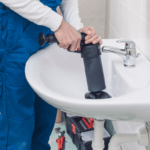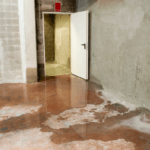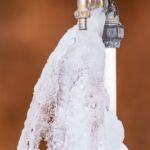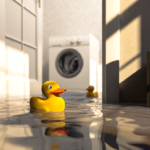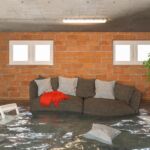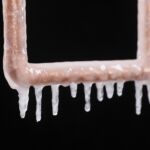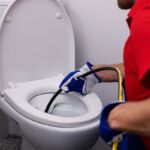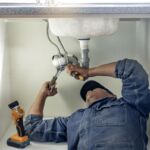
Nov 9, 2023 | Leaking Pipe, Plumbing services, Sump Pump
Many households deal with the common and frequently disastrous issue of basement flooding. Whether brought on by persistent rain, melting snow, broken plumbing, or inadequate drainage, basement flooding may have devastating financial and emotional effects.
However, you may reduce the chance of basement flooding and safeguard your property by taking the appropriate preventive steps and taking a proactive attitude. This article looks at a detailed manual on how to guard against basement flooding and prevent water damage to your property.
Tips To Prevent Your Basement Flooding
The following tips will help you have a great time in preventing basement flooding and water damage to your house, read further for detailed methods:
Maintain Gutters and Downspouts
Make sure your gutters and downspouts are in good functioning order as one of the major measures to prevent basement flooding. Water overflow caused by clogged or damaged gutters can accumulate near the home’s foundation and raise the possibility of basement flooding.
Examine and clean gutters regularly, clearing them of leaves, objects, and anything else that can restrict the flow of water. To stop water from leaking into the basement, extend downspouts away from the foundation and send water at least five feet away from your property.
Proper Landscaping & Grading
Your landscape’s grade is very important for preventing basement flooding. To keep water away from the basement walls, the land around your house should ideally slope away from the foundation.
Water can build up around the foundation due to poor grading, which can cause seepage into the basement. If necessary, have the grade evaluated and adjusted by a qualified landscaper or contractor to ensure appropriate drainage away from your property.
Install a Sump Pump System
A sump pump is a crucial piece of equipment that keeps your basement dry by draining extra water that builds up around the foundation. The sump pump is often situated in a pit where water is collected and activates automatically when the water level exceeds a specified level.
Check your sump pump frequently to make sure it is functioning properly, and think about buying a battery backup system to ensure continued operation even during power outages.
Waterproof Your Basement
A proactive strategy to stop water from entering in the first place is to apply waterproofing techniques to your basement. To build a barrier against moisture on basement walls and flooring, think about utilizing waterproofing coatings or sealants.
Additionally, look for any foundation gaps or cracks in your basement and properly seal them. This will shield your home from potential structural damage brought on by water seepage and avoid basement flooding.
Install Window Well Covers
When it rains or snows a lot, basement windows might be access places for water. Window well covers can be installed to create a barrier that stops water from collecting around the windows and leaking into the basement. Window well coverings also ensure improved ventilation and natural light for the basement by keeping debris, leaves, and animals out.
Check and Maintain Plumbing Systems
Unexpected basement flooding can be caused by faulty plumbing. Check the pipes, faucets, and drains in your home’s plumbing system regularly for leaks, obstructions, and wear.
Pay attention to the water pressure and keep an ear out for any strange noises that can point to a potential issue. To avoid water damage to your basement and other areas of your house, fix any problems right away.
Consider French Drains
French drains are a reliable drainage system created to divert water away from the foundation of your house. These drains are made out of underground, gravel- or rock-encircled, soil-covered perforated pipes.
When the foundation becomes clogged with water, it seeps into the perforated pipes and is diverted away from the basement. Installing French drains can help keep your home dry during heavy rains and drastically lower the risk of basement flooding.
Invest in a Backup Power Generator
Power outages during powerful storms are common, and if your sump pump depends only on the electrical grid, it could cause it to stop working.
Purchasing a backup generator guarantees that crucial appliances, such as the sump pump, keep working even during power outages, preventing basement flooding continuously.
Install Basement Flood Alarms
Specialized tools called basement flood alarms can measure the water levels in your basement. When water starts to leak into the basement, these alarms serve as an early warning system and let you know.
Installing flood alarms enables you to respond quickly to the problem before it develops into a major flooding incident. You may receive real-time notifications no matter where you are by connecting some high-tech flood alarms to your smartphone.
Elevate Electrical Outlets and Appliances
The risk of basement flooding to basement-located electrical outlets and appliances is significant. Elevate appliances like water heaters, furnaces, washers, and dryers above any potential water level, including electrical outlets, circuit breakers, and other appliances.
Through this precaution, flooding-related electrical risks and harm to important household appliances can be reduced.
Create a Green Roof or Rain Garden
An eco-friendly and visually beautiful solution to stop basement flooding is a green roof or rain garden. Growing plants on your roof, known as a “green roof,” absorb and hold onto rainwater, thus lowering the overall runoff that may end up in your basement.
In a similar vein, rain gardens are landscaped spaces created especially to catch and absorb rainwater. Rain gardens and green roofs both help manage stormwater and stop basement flooding.
Regularly Inspect and Maintain Foundation Walls
To prevent water from entering your basement, the integrity of your foundation walls is essential. Regularly inspect your property to look for any cracks, leaks, or indications of structural damage.
Repair any problems discovered during these inspections right away to increase the stability of the foundation and stop water intrusion.
Consider Exterior Drain Tile Systems
Buried pipes that are built around your home’s foundation make up exterior drain tile systems. By gathering extra water and rerouting it away from the foundation, these pipes reduce the possibility of basement flooding.
Exterior drain tile systems offer an additional degree of security, even if interior drain tile systems are more frequent, particularly in regions with a lot of rainfall.
Educate Family Members and Practice Preparedness
Inform your family members about the dangers of basement flooding and the appropriate precautions. Everyone should be aware of where the key utility connections are located and how to turn off the main water supply in case of an emergency.
Create a family emergency plan and periodically practice it to ensure that everyone is aware of what to do in case of a flood or other water-related event.
In Conclusion
A proactive strategy and routine maintenance of your home’s drainage and plumbing systems are required to prevent basement flooding. You may considerably lower the likelihood of basement flooding and guard your house against water damage by putting the preventive steps covered in this thorough guide into practice. Keep in mind that the secret to protecting your home’s structural integrity and keeping your basement dry is being proactive and ready.
Are you concerned about the risk of basement flooding in your home or commercial property? Tap Tech is here to help you stay ahead of the game with our expert prevention tips and solutions! Basement flooding can cause extensive damage, disrupt your life, and lead to costly repairs. Don’t wait for disaster to strike – take proactive measures to safeguard your property with the guidance of Tap Tech.
Contact us today to schedule a consultation and secure your property’s safety. Together, let’s create a flood-resistant space that ensures peace of mind and protects your investment for years to come!
Book our services now!
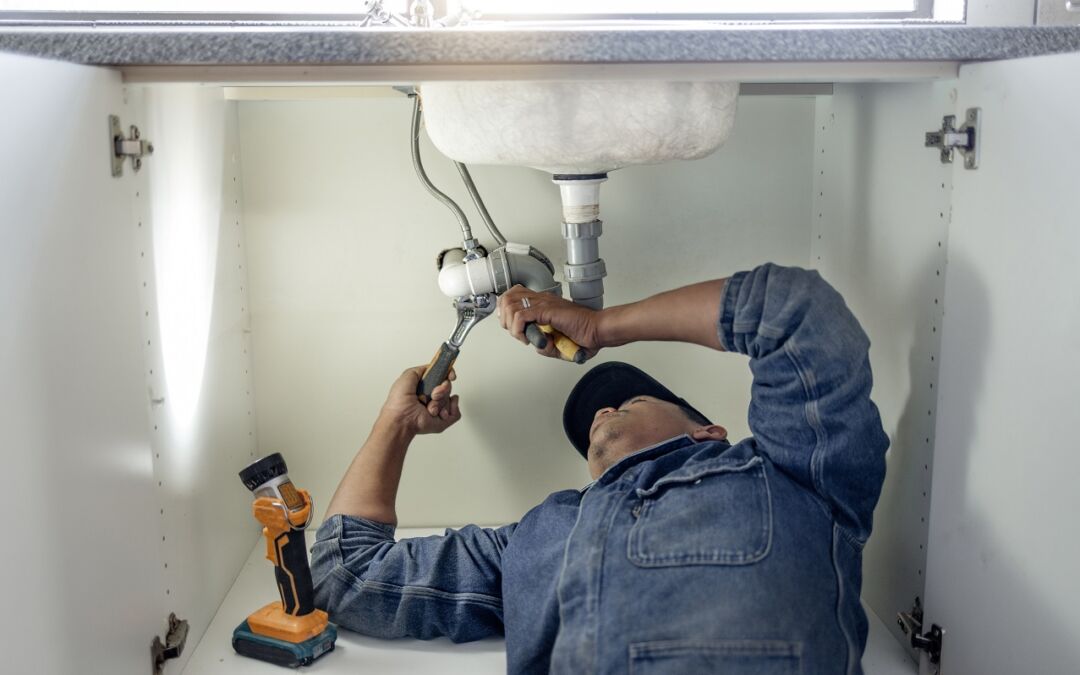
Sep 30, 2023 | Plumbing services
Maintaining the health of your plumbing system is vital for the comfort and functionality of your home. Regular maintenance not only preserves the longevity of your plumbing infrastructure but also helps prevent costly repairs. By implementing routine plumbing upkeep procedures, you can identify potential problems early on and take proactive measures to address them.
This article will outline key plumbing maintenance tips that every homeowner should be familiar with.
Leak Detection and Repair
Constant vigilance for leaks in your plumbing connections, pipes, and fixtures is essential. Be alert for signs such as water stains, moisture, or dripping water. Even a minor leak, if neglected, can waste substantial amounts of water over time and result in considerable damage. If you detect any leaks, don’t hesitate to call a licensed plumber for repairs.
Water Pressure Regulation
The water pressure in your home directly affects the flow of water. Using a pressure gauge, you can regularly check your home’s water pressure. Ideally, it should fall within a range of 40 to 60 psi (pounds per square inch). If the pressure deviates from this range, consider installing a pressure regulator to maintain optimal levels and protect your plumbing system.
Insulating Exposed Pipes
For homes in colder climates, insulating exposed pipes is a crucial preventive measure against potential pipe bursts during winter. Prevent freezing by covering exposed pipes with heat tape or foam pipe insulation wraps, especially in unheated areas like attics, crawl spaces, or basements.
Drain Cleaning and Clog Prevention
Regularly clear clogs to ensure the optimal performance of your plumbing system and to prevent backups. Use drain screens to prevent debris from entering the drains and clean them frequently. Avoid pouring grease, coffee grounds, hair, or any other potential clog-inducing materials down the drain. Utilize a plunger or a plumbing snake to clear stubborn clogs.
Water Heater Maintenance
Routine maintenance of your water heater can extend its lifespan and ensure peak performance. Drain the tank at least once a year to eliminate sediment accumulation. Regularly check the temperature settings, test the pressure relief valve, and occasionally have a licensed plumber inspect the system.
Routine Septic Tank Maintenance
If your home utilizes a septic system, routine maintenance is crucial for its smooth operation and to prevent backups. Arrange for a professional to inspect and pump out your septic tank regularly. Avoid pouring excessive chemicals or non-biodegradable materials down the drains.
Professional Inspections
Lastly, schedule periodic professional inspections to catch problems before they escalate. A qualified plumber can detect hidden leaks, evaluate the condition of your pipes, and recommend necessary maintenance or repairs.
To Summarize
Adhering to the advice in this article can help keep your plumbing system in top condition and prevent expensive repairs. Even with diligent maintenance, complex plumbing issues may arise that necessitate professional help.
Plumbing Maintenance Made Easy
With over 25 years of experience, Tap Tech is South Eastern Ontario’s premier plumbing company. Our licensed technicians have the skills to accurately assess any residential or commercial plumbing problem and make repairs quickly and efficiently.
We handle everything from routine maintenance and installations to major repairs and 24/7 emergency calls. We utilize advanced diagnostic tools and provide long-lasting solutions.
At Tap Tech, we make plumbing service worry-free with transparent, upfront pricing on all jobs so you aren’t surprised by hidden fees.
Contact us at 343-305-1172 to schedule your plumbing inspection today!

Sep 25, 2023 | Plumbing services
Maintaining a properly functioning toilet is essential for any household. When faced with toilet issues, it’s crucial to determine whether repairs or replacement are necessary. To avoid unnecessary expenses and ensure optimal functionality, it’s essential to make informed decisions.
In this comprehensive guide, we’ll explore common toilet problems and provide insights on when to fix or replace your toilet.
Your Toilet is Leaking
Toilet leaks are a prevalent plumbing problem that can lead to extensive damage and health issues. The cause of a leak can vary, from faulty flush valves to worn-out flappers. Addressing leaks promptly is crucial to prevent further damage. If you notice any signs of leakage, such as water pooling around the base, continuous running water, or unusual sounds, it’s time to take action.
Your Toilet is Clogged
Clogged toilets can be a frustrating issue, but it’s important to approach the situation wisely. For minor clogs that don’t extend beyond one foot below the waterline, attempting to unclog it yourself using a plunger may be effective. However, if the clog persists or the water level rises, it’s recommended to seek professional assistance promptly.
Professional assistance typically involves a thorough inspection and resolution of the underlying issue. Plumbers will remove debris, improve drainage, disinfect the pipes, and ensure proper reinstallation of all components.
Water Damage in Your Bathroom
Water damage in the bathroom often originates from a leaky toilet. Identifying and rectifying the source of the leak is crucial to prevent further damage. If visible signs of leakage are absent, utilizing an electronic leak detector can help identify hidden leaks by detecting moisture and sounds caused by running water.
If no leaks are found or repairs fail to resolve the issue, replacing your old toilet with a modern, corrosion-resistant model is worth considering. Newer toilets are designed to conserve water and often offer dual flush options, providing further cost savings.
To Summarize
Knowing when to repair or replace your toilet is vital for maintaining a functional and efficient bathroom. Addressing leakages promptly, seeking professional help for persistent clogs, and rectifying water damage are essential steps in preventing further complications. If replacement becomes necessary, opting for a modern, water-efficient toilet can enhance sustainability and reduce long-term costs.
Need a Reliable Plumber? Call the Experts at Tap Tech!
Are you experiencing toilet issues that require professional assistance? Tap Tech is your reliable, same-day emergency plumbing service provider in South Eastern Ontario. With our 5-star service, we are committed to resolving your plumbing problems promptly and efficiently with transparent, upfront pricing.
Don’t wait for days or weeks to repair urgent plumbing issues such as leaks, clogs, water damage, and more. Our expert plumbers specialize in handling emergency situations, providing exceptional service when you need it the most.
Call us at 343-305-1172 to experience our reliable and efficient plumbing services. Count on Tap Tech for first-class plumbing services 24/7.

Sep 20, 2023 | Plumbing services
A sewer backup is an undesirable and potentially hazardous event that can severely damage your property and disrupt your daily routine. This occurrence happens when sewage and wastewater from your home cannot flow normally and start to backup into drains, sinks, or other elements of your plumbing. The good news is that by understanding the common causes of sewer blockage and implementing preventive measures, you can avoid this costly and troublesome issue. This article will delve into the primary causes of sewage blockage and provide practical tips to help prevent them.
Unveiling the Causes of Sewer Backup
Here are some common culprits behind sewer backups. By recognizing them, you can take preventative measures accordingly.
Tree Roots
One of the main causes of sewer backlog is invasive tree roots. As these roots are attracted to the moisture and nutrients found in sewer lines, they can penetrate the pipes over time, leading to clogs and even pipe damage. To mitigate this issue, avoid planting trees close to sewer lines, and if trees already exist, consider regular root cutting or installing root barriers to redirect growth away from the pipes.
Clogged Drains and Toilets
Sewer backups often stem from abused toilets and drains. This can be a result of flushing items such as diapers, sanitary products, grease, or excessive toilet paper that shouldn’t be discarded in toilets. Moreover, pouring grease or cooking oil down the drain can eventually lead to obstructions.
Aging Sewer Systems
Over time, sewer pipes can become damaged, crack, or collapse, leading to blockages and backups. This is particularly a problem in older homes with outdated sewer systems. If you live in an older property, it’s advisable to engage a professional plumber to inspect your sewer pipes for any signs of wear and tear. With regular maintenance and timely repairs or replacements, sewer backups caused by aging infrastructure can be avoided.
Heavy Rainfall and Flooding
During intense rainfall or flooding events, the sewer system can back up due to the excessive influx of water. This is especially the case in areas with combined sewer systems where wastewater and stormwater share the same pipes. To prevent backups during periods of heavy rain, ensure that downspouts and gutters on your property are directed away from the foundation.
Blocked Main Sewer
Blockages in the main sewer line can lead to backups in multiple homes or even throughout the neighborhood. This can be due to accumulated debris, grease build-up, or invasive tree roots. By being mindful about what you flush down the drains and promptly alerting local authorities if there are signs of a backup, you can help prevent more extensive issues.
Preventive Measures to Avoid Sewer Backup
Implementing the following preventive strategies can help protect your home from sewer backups:
- Regularly inspect and maintain your sewer pipes.
- Avoid planting trees near sewer lines.
- Dispose of waste properly and avoid flushing non-degradable items.
- Use drain strainers to catch debris.
- Refrain from pouring grease or oil down the drain.
- Direct gutters and downspouts away from the foundation.
- Install a backwater valve or sump pump for added protection.
In Summary
Sewer blockages can lead to substantial damage and inconvenience. However, by being mindful of the common causes and taking preventive measures, you can significantly decrease your risk of experiencing a sewer backup. Through awareness and action, you can maintain the integrity of your home’s plumbing system and enjoy peace of mind. For reliable and prompt assistance with sewer backup issues in South Eastern Ontario, contact Tap Tech, your trusted emergency plumbing service. We specialize in same-day, 24/7 emergency plumbing services to address urgent situations such as sewer backup, flooding, sump pump failure, and more, with upfront and transparent pricing. With over 25 years of experience, our licensed plumbers are always on standby to handle any residential or commercial plumbing emergency. We have the latest equipment to safely unclog drains, remove blockages, and get your plumbing flowing freely again. Schedule your appointment with Tap Tech now by calling 343-305-1172!

Sep 10, 2023 | Plumbing services
Understanding the distinction between an emergency plumber and a regular plumber is critical when you’re faced with a plumbing issue. These issues could be anything from a burst pipe to a severe leak, or a clogged toilet. While both emergency and regular plumbers provide services to resolve your plumbing concerns, significant differences exist between the two.
In this article, we’ll delve deeper into the distinctions between an emergency and a regular plumber, helping you decide who to call for your plumbing issues at what time.
Emergency Plumbers
Emergency plumbers specialize in addressing immediate, severe plumbing problems that require urgent attention. Their services are available around the clock, including weekends and holidays, ready to tackle plumbing emergencies that could compromise the safety of your home or result in substantial damage.
Quick Response
Emergency plumbers are characterized by their swift response to crises. They understand the severity of the situation and prioritize delivering rapid assistance to prevent exacerbating the problem. Their expedited response time can be crucial in minimizing the damage caused by a plumbing mishap.
24/7 Availability
Plumbing emergencies don’t abide by regular business hours. Thankfully, neither do emergency plumbers. With their round-the-clock availability, you can receive the assistance you need anytime. Whether you’re dealing with a gas leak or a burst pipe causing a flood in your basement, an emergency plumber is on standby to assist when you need them most.
Specialized Training
Emergency plumbers are equipped with specialized training to handle crucial plumbing problems. Their expertise and skills enable them to accurately assess and resolve emergencies, utilizing appropriate methods and tools to complete the task efficiently.
Regular Plumbers
Regular plumbers, often referred to as routine plumbers or plumbing contractors, primarily deal with non-emergency plumbing services. They manage routine maintenance, repairs, installations, and other plumbing tasks that do not demand immediate attention or pose an immediate threat to your property.
Scheduled Appointments
Regular plumbers typically work according to scheduled appointments during standard business hours. If you have a minor leak or a dripping faucet that doesn’t require urgent attention, a regular plumber is the person to call. You can set up an appointment at a time that’s convenient for you.
Wide-ranging Plumbing Services
In addition to addressing emergency repairs, regular plumbers offer an extensive range of plumbing services. They can assist with new construction, standard upkeep, system upgrades, home renovations, and other non-urgent plumbing requirements. Regular plumbers boast a broad range of plumbing skills and are competent in handling both residential and commercial projects.
Preventive Maintenance
Regular plumbers play a vital role in preventive maintenance. They can conduct routine checks, identify potential issues, and provide recommendations to prevent future plumbing emergencies. Regularly engaging a plumber for maintenance can decrease your likelihood of unforeseen emergencies and enhance the lifespan of your plumbing systems.
When to Call Each
Choosing between an emergency or regular plumber should depend on the urgency and seriousness of the issue. If you’re facing a severe leak or sewer backup that demands immediate attention, it’s time to call an emergency plumber. They are equipped to handle urgent situations and provide prompt assistance.
For non-emergency plumbing issues like routine maintenance, installations, or repairs that can be scheduled, a regular plumber is your best bet. They offer comprehensive plumbing services for residential and commercial projects, ready to resolve your plumbing concerns during standard business hours.
Conclusion
Understanding the difference between emergency and regular plumbers can help you make informed decisions when dealing with plumbing issues. It’s crucial to assess the urgency and severity of your plumbing problem to decide who to call.
Is a sudden plumbing issue causing stress? Look no further. Tap Tech offers both regular and emergency plumbing services to cater to your diverse needs.
Our team of experienced and licensed plumbers is available around the clock, ready to respond swiftly to plumbing emergencies while ensuring the safety of your property.
Don’t wait for a minor issue to turn into a major problem. Reach out to Tap Tech today for prompt and reliable emergency plumbing service with no hidden fees.
Visit Our Website To Learn More About Our Services!

Aug 30, 2023 | Plumbing services
Flooding can cause severe damage to your possessions and property, marking it as a disastrous event. Although some floods stem from natural disasters and uncontrollable external circumstances, homeowners can take proactive measures to reduce the risk of flooding.
This article provides valuable insights and tips to help you mitigate flooding in your home and safeguard your investment.
Prioritizing Maintenance of Gutters and Downspouts
Regular cleaning and clearing of your gutters and downspouts are crucial for ensuring proper water flow. It’s essential to remove any detritus such as dirt, twigs, or other debris that could clog the system and lead to an overflow of water. The downspouts should ideally direct water at least three feet away from your property’s foundation.
Importance of Proper Drainage Systems
If your property is susceptible to water accumulation or located in an area with frequent rainfall, installing a reliable drainage system should be a priority. Effective systems such as French drains, sump pumps, and catch basins can successfully divert water away from your home’s foundation, preventing seepage into the basement or crawl spaces.
Grading Your Landscape
Proper landscape grading is essential for efficient water drainage. Ideally, the surroundings of your foundation should slope away to prevent water from pooling near the structure. If necessary, consider engaging a professional landscaper to assess your property’s grading and make necessary adjustments.
Regular Inspection and Sealing of Foundation Cracks
It’s important to frequently inspect your foundation for any cracks or openings and promptly repair them. Even minor cracks can allow water ingress during heavy rains or floods. Consider using waterproof sealants or consulting a professional contractor for extensive repairs.
Installation of Window Well Covers
If your basement windows feature window wells, consider installing well covers. These can significantly reduce the likelihood of basement flooding by preventing the accumulation of snow, ice, and debris in the window wells.
Maintenance of Plumbing Systems
Regular maintenance of your plumbing system can help prevent internal flooding due to leaks or pipe bursts. Regularly check your home for leaky areas, water stains, and irregular water bills. Make sure all your plumbing fixtures and water supply lines are in good condition, replacing any worn-out components promptly.
Installing a Backflow Prevention Valve
To safeguard your home against flooding and sewer backups, consider installing a backflow prevention valve. This device allows sewage to flow out while preventing it from returning to your home during a sewage system overload. Consulting a professional plumber can assist you in choosing the right valve for your system.
Elevating Electrical Components
Consider elevating key systems such as your HVAC, electrical panel, or other electrical components if they are located in a flood-prone area like the basement. Elevating these systems can protect them from water damage and mitigate the risk of electrical hazards.
Reviewing Your Insurance Coverage
Understanding your insurance policy and ensuring adequate flood damage coverage is crucial. As most standard homeowner’s insurance policies do not typically cover flood damage, consider purchasing separate flood insurance to protect your home and belongings.
To Wrap It Up
By following these preventive measures, you can significantly reduce the likelihood of flooding in your home and protect your property from water damage. However, in the unfortunate event of a flood, timely professional assistance is vital.
Safeguard Your Home
Flooding can cause massive damage, but many issues can be prevented with proper drainage maintenance. Tap Tech has over 25 years of experience handling drainage systems and flood prevention for homes in South Eastern Ontario.
Our team of licensed plumbers are available 24/7 to handle any residential or commercial plumbing issues. At Tap Tech, we believe in transparent, upfront pricing so you aren’t surprised by hidden fees.
For round-the-clock plumbing repairs from experts you trust, call 343-305-1172 anytime!






